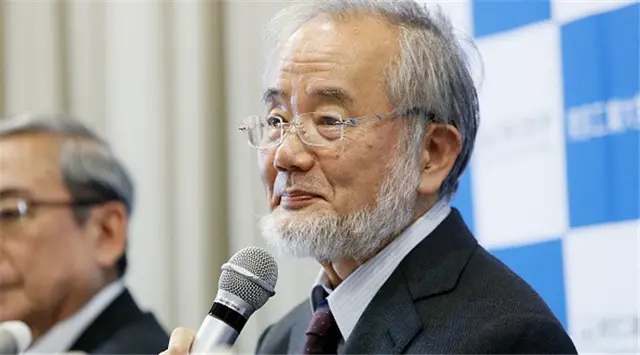Yoshinori Ohsumi attends press conference at Tokyo Institute of Technology on October 3, 2016 in Tokyo, Japan. The 2016 Nobel Prize for physiology/medicine was awarded to Yoshinori Ohsumi of the Tokyo Institute of Technology for discoveries about autophagy - how the body breaks down and recycles cellular components.
A Japanese scientist, who meticulously studied yeast cells to understand how cells degrade and renew itself, has won the 2016 Nobel Prize for Physiology or Medicine. Meet Yoshinori Oshumi, the man who discovered a process called authophagy that cannabilizes and recycles cells.
Autophagy (Greek words for "self-eating") is a fundamental process of cell degredation and recycling, which helps our cells to slow down aging, infection and even immunize us from cancers and other diseases. This process had been in the loop of scientists since 1960s, during the time when lysosomes were discovered. Lysosomes are the "storage" for degraded cells. Scientists then observed that cells seem to "eat itself," destroying its contents. It will then enclose its membranes and will form sac-like vesicles which are transported to lysosomes.
Cells are difficult to study, not only because of its microscopic size, but also understanding its complex process. But for Oshumi, this is definitely not a case.
When Oshumi started his lab in 1988, he began his study aiming to uncover the mystery on how exactly autophagy works -- and he did not fail. Using baker's yeast, he studied its cells to identify genes involved in the process of autophagy. After determining the genes, Oshumi proceeded to replicate the autophagy; thus, concluding the process can also be true to human cells.
"Looking into bodily processes, I found that we have an ongoing renewal process without which living organisms can't survive," Ohsumi tells the Japanese broadcaster NHK. "This recycling process did not receive as much attention as it deserved, but I discovered that we should be paying more attention to this autophagy process," Smithsonian reported.
Autophagy helps restore "worn-out" parts of the cells that keeps it at its "tip-top" shape. Its importance to physiology is surely immeasurable and revolutionary.
Ohsumi is a cell biologist who was born 1945 in Fukuoka, Japan. He received his Ph.D. from the University of Tokyo in 1974. He spent three years at Rockefeller University, New York, before he returned to the University of Tokyo, where he established his research group in 1988. He is since 2009 a professor at the Tokyo Institute of Technology.
(NATUREWORLDNEWS)
 简体中文
简体中文

